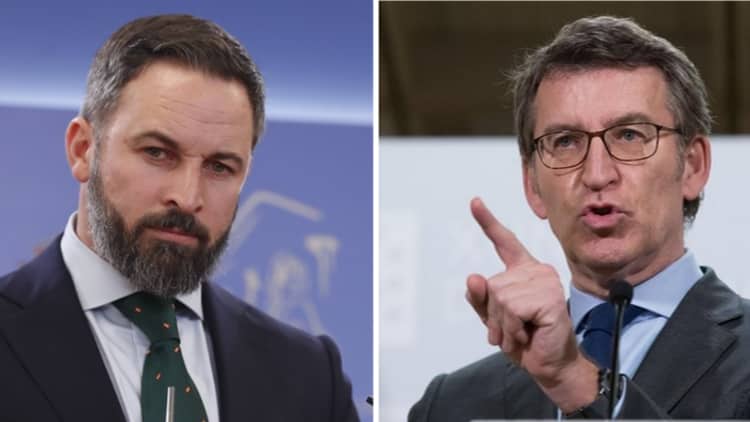Ángel Collado
Vox’s grotesque motion of censure against the Government, in addition to confirming the censured party in its parliamentary majority, has facilitated the People’s Party planned pre-electoral move to mark distances with the extreme right-wing party.
If Pedro Sánchez is presenting himself at the head of his coalition with the populism of the most extreme left in order to remain in power, Alberto Núñez Feijóo aspires to broaden his bases to bring together all the center right and depend as little as possible on the formation of Santiago Abascal. Madrid, in view of the May 28 elections, is the first test of the PP’s commitment to achieve broad majorities.
Vox was born with the aspiration of replacing the PP from the most conservative or populist positions of the right, it hit the ceiling in the 2019 elections and after failing in the autonomic elections of Madrid and Andalusia in 2021 and 2022, it is promoted as an indispensable and patriotic complement to what Abascal calls “the cowardly right wing”: the PP.
Between the inspiration of Lepen and Orban, now also of Meloni, the Spanish extreme right grew, fed back with the radicalism of the Government of Sanchez until the People’s Party rebuilt its alternative and recovered a good part of the vote that had gone to Ciudadanos.
PP denounces as a shameless “two-pronged” maneuver Vox’s latest in favor of Sanchez and the PSOE. They refer to the motion of censure in Congress called for the greater glory of Abascal’s protagonism presenting himself as head of the opposition while serving the President of the Government to launch his pre-campaign. But also to the systematic opposition that Vox exercises in Madrid against the projects of the regional government of Isabel Díaz Ayuso.
Feijóo and Ayuso have responded with a tactical and pre-electoral break with Vox to the tacit alliance of interests between the left and those of Abascal to stop the PP. The head of the opposition is interested in fleeing from the image spread by Sanchismo that he can only aspire to the government in coalition with the extreme right. The president of the Community of Madrid already suffers the consequences of depending on Vox when the party headed in the region by Rocío Monasterio allies and votes without complexes with socialists and communists against the regional executive.
The People’s Party intends to obtain electoral advantage with its denunciation of the “pincer” practiced by Abascal’s party. They believe in their leadership that they still have some margin of vote recovery among the more right-wing electorate, besides taking for granted that they will consolidate themselves in the centre.
Sánchez has opted to do the opposite of the PP by personally promoting his vice-president Yolanda Díaz as the candidate of all the space to the left of the PSOE, a sort of electoral subcontractor in order to consolidate his coalition with the populists, supported by the separatist parties, before the next general elections. While accusing Feijóo of being tied to the extreme right for a future government, he naturalizes his left front.
In Madrid the PP has been able to govern with autonomy during the last two years thanks to the ample majority obtained by Ayuso, 65 seats in an assembly of 136 deputies. Vox, which was left with 13, only required abstention, but in the last key votes Abascal’s party has gone to the opposition to overthrow the Community’s budgets and a tax plan to attract foreign investment. Too much liberalism for the autarkic tendencies of Monasterio and Abascal.
The PP already groups the center right in Madrid, as it demonstrated in the last regional elections by reaching 44.7 percent of the votes. To reach the absolute majority Ayuso needs four seats and has to grow at the expense of the 9.5 obtained by Vox in 2021, or benefit from a possible disappearance of Podemos in the more than likely event that the extreme left again goes to the polls divided into two brands: the local one of Mas Madrid and the national one of the party founded by Pablo Iglesias. The cut-off point for the allocation of seats is 5 percent and Podemos did not pass 7.2 percent despite the fact that it was headed by its leader.
The dissociation from Vox that Feijóo now proclaims is aimed at achieving the success achieved by Ayuso in those elections by adding more seats than all the left together. It would mean depending as little as possible on Abascal. Hence the determination of the far-right formation to present itself as the indispensable and inevitable complement to the PP. The same idea on which Sanchez insists.







